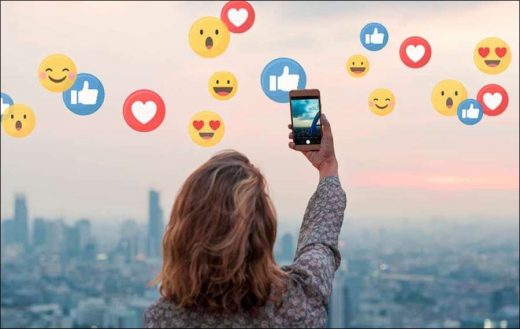Social media addiction. Do you check Facebook hundreds of times per day? Do you like hitting “Like” more than you like speaking with live humans? Is Instagram more important to you than your mom? Read on to find out what this might say about your personality.
In this hi-tech, pre-armageddon, screen-filled modern world, social media is all pervasive.
It has sucked us in. It is the new God. We are now its slave.
That might be over-egging things slightly, but for some people, social media has become a true addiction.
So, how do you know if your social media habit has descended from a harmless pastime into a full-blown addiction?
Well, if you lost your job because you’re always perusing Instagram or you split up with your wife because you chose Facebook over her, that’s a pretty good sign. All joking aside, social media addiction is a real thing, and it messes with people’s lives.
The ‘dark side’ of tech
Despite a meteoric rise in the “dark side” of information technology (IT), relatively little research has gone into IT addiction. Although personality traits are known to play important roles in other types of addiction, no one really knows which traits predict social media addiction.
Recently, brave researchers from Binghamton University in New York took it upon themselves to lift the lid on this most modern affliction.
“There has been plenty of research on how the interaction of certain personality traits affects addiction to things like alcohol and drugs. We wanted to apply a similar framework to social networking addiction.”
Study leader Isaac Vaghefi
To get some answers, Vaghefi — who is an assistant professor of information systems — teamed up with Hamed Qahri-Saremi, of DePaul University in Chicago, IL, and more than 300 college-age students got involved.
The investigators probed the participants about their social media use, of course, but they also asked a barrage of other questions to get an insight into their personalities.
Personality model
The research was based on the five-factor personality model. It’s a framework that has been used liberally throughout psychology since the 1980s. The five traits that, in varying amounts, make up most human personalities are neuroticism, conscientiousness, agreeableness, extraversion, and openness to experience.
So, the main thrust of the study was to figure out which (if any) of these personality traits means that you are more likely to find yourself detrimentally sucked into a social network addiction.
The team found that three of the five traits — neuroticism, conscientiousness, and agreeableness — were particularly linked with social network addiction. But, this is psychology, and we’re talking about the human brain here, so it’s not a simple story.
As Vaghefi notes, “It’s a complex and complicated topic. You can’t have a simplistic approach.” So, when they stuck their analytical fingers deeper into the figurative data pie, more complicated relationships were found. Their findings were presented at the 51st Hawaii International Conference on Systems Science, held in Waikoloa Village.
What did they find? Firstly, neuroticism — which is how prone someone is to feeling anxious and stressed — increases the chances of being hooked on social media. Conscientiousness — those annoying people who can control their impulses and achieve their goals (I’m so jealous of those folk) — decreased the chances of being an addict.
So far, so simple, but here’s where it gets a little stranger: a person can be both conscientiousness and neurotic, and, in those people, there is a power struggle.
Like a fairytale gone wrong, evil conquers good: neuroticism overpowers conscientiousness. In other words, the baddies win and social media addiction is more likely to rear its head.
Can being agreeable save you?
The next plot twist features agreeableness — which means how friendly, helpful, and empathetic someone is. Overall, agreeableness didn’t really make much of a difference to a person’s risk of social media addiction. However, when agreeableness and conscientiousness were combined inside the same human, it was a different story.
Someone who is not particularly agreeable or conscientious would be generally unsympathetic and irresponsible (sounds like a great guy, right? Every group of friends has someone like that, though, and, if you can’t think who it is in your immediate circle, it’s probably you). These people, it turns out, are more likely to have social media addiction.
Here, the plot thickens once again. This river runs both ways: people who have high levels of agreeableness and conscientiousness also have an inflated risk of social media addiction.
This finding surprised the scientists. They think it might be to do with “rational addiction” — friendly, conscientious people may actively spend more time engaging on social media because they tend to believe that they gain a genuine benefit from it, and they go out of their way to keep in touch with friends and family to nourish their network. Aahhhhhh…isn’t that sweet?
If this is true, it would be a whole new angle to addiction that isn’t found outside of the IT universe. The addiction would, effectively, be developed on purpose — for wholesome reasons.
Whether or not it would still be detrimental to the individual is another question that will need to be answered by future studies.
Of course, more research is likely to follow as our new IT overlord slowly consumes each and every one of us. Perhaps, in decades to come, social addiction will be the norm and psychologists will be running studies to investigate how 2 percent of the population can resist opening their Facebook app more than once per day.
We’ll have to wait and see. For now, share this article on your social media accounts, then put your cell phone down and go for a walk outside. You might just enjoy yourself.
Views: 233



